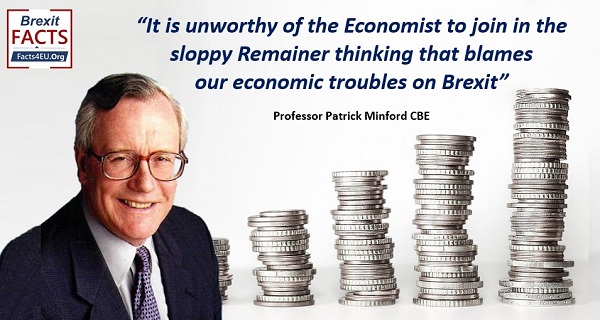'We find no statistically significant ongoing economic damage of leaving the EU,' says respected Professor
How the effects of Brexit on trade, investment, and GDP have been miscalculated in recent work

Montage © Facts4EU.Org 2023
Professor Patrick Minford provides a compelling argument, summarised by Facts4EU and CIBUK
Ever since the UK voted to leave the European Union following the historic referendum result in 2016, arguments have raged over the impact of Brexit on the British economy.
Analysis from the mainstream media has been overwhelmingly negative. But as the distinguished economist Professor Patrick Minford argues, closer examination of the data makes it almost impossible to jump to such conclusions. The Economist declined to publish this, so we are doing so.
Brexit Facts4EU.Org Summary
How the short run effects of Brexit on trade, investment and GDP
have been miscalculated in recent work
By Professor Patrick Minford CBE, of Cardiff Business School, Cardiff University
The full paper can be read here
Across a range of criteria - trade, levels of investment, or GDP – Professor Minford’s findings are unambiguous:
“We find no statistically significant ongoing effect of leaving the EU.”
As expected, the volatility in the data caused by the external shocks of war and disease make the case for an identifiable Brexit-related economic shock almost impossible to compute.
In that sense, argues Professor Minford, “the Brexit effects ‘found’ by media commentators are therefore of doubtful validity.”
About the author: Since 1997 Professor Patrick Minford CBE has been Professor of Applied Economics at Cardiff Business School, Cardiff University. Previously he was Professor of Applied Economics at the University of Liverpool.
In 2016, Prof Minford was a key member of the ‘Economists for Brexit’ group which stood against the consensus view of many economists, and advocated the UK’s departure from the European Union.
We are pleased to share Professor Minford’s article with our readers in this summarised version, with a link to the full edition below this.

Background to the current debate
With multiple economic shocks reverberating around the world from Covid to Ukraine and the rising cost of energy, discerning a ‘Brexit effect’ amongst all of these involves a very high level of forensic analysis.
The way this is done is by an ‘Event Study’
The methodology for analysing effects on economic parameters is known as an ‘event study’. That is, to set out a “’normal relationship’ determining the economic variables of interest and then to identify the point of time at which the Brexit element intervened; this key date of Brexit arrival then allows us to identify the Brexit effect mathematically as a shift in the relationship definitely due to Brexit owing to its coinciding with that date.”
With so many other economic shocks occurring before and after Brexit, the question arises whether the estimated effect of Brexit is statistically significant.
MEASURING THE BREXIT ‘EVENT’
Comparative Methodologies
Professor Minford discusses some of the comparative methodologies commonly used by economists for estimating the effects of an economic event in one country against a group of others.
In particular he highlights the danger of the ‘doppelganger’ (‘D’) method: “in which a group of other economies which in the past has behaved similarly to the UK is compared with the UK over the period since Brexit; if performance changes this is attributed to Brexit.”
However the real danger of this ‘D method’ is that :
“it identifies the effect of Brexit as any changes in the UK’s performance since Brexit relative to the D group. “This is manifestly incorrect. There are many other shocks to both the UK and this other group occurring both before and after Brexit that can between them generate these changes.”
Measuring the impact of the Brexit Event
Instead of the ‘D method’, the preferred benchmark comparator is the OECD average where no selection is needed and any comparisons with the UK economy is guaranteed free of selection bias. However, rather than use any comparator which will necessarily differ from the UK, it is better to use the UK’s own relationships over past and present to detect shifts in behaviour due to Brexit.
Professor Minford outlines in some depth the standard economic methodologies which are used to identify the ‘shock’ of Brexit and to estimate its size in comparison with the other group.
Having established the method, it is now possible to use economic theory to measure the impact of Brexit on the UK economy.
‘Temporary and minor disruption’
On the basis of the detailed economic analysis, any disruption following Brexit is to be expected but should only be temporary as the UK remakes its trade deals and recalibrates its economic relations with the EU via the Trade and Co-operation Agreement (TCA).
MEASURING BREXIT: TRADE, GDP & INVESTMENT
Finally, as Professor Minford explains
“Any effects of Brexit must come through via trade, so we explore here the effects on trade as well as those on GDP and investment. Our method avoids any selection bias by simply using the OECD average as the group of countries to compare with the UK when we are gauging whether the comparison shifted post-Brexit.”
From there, Professor Minford applies a set of economic regressions across trade, GDP and Investment, regressing UK data onto OECD data. He also examines effects found in the UK’s own relationships, with no comparator at all- the preferred method.
In each and every case, there is no significant effect of Brexit.
CONCLUSIONS
Professor Minford’s findings are clear and unambiguous:
“Whatever relationships we examine, whether trade, investment or GDP,
we find no statistically significant ongoing damage of leaving the EU.”
Introducing a Brexit ‘dummy variable’ economic model into the regressions above made no significant difference. Brexit was just one of many disruptive economic shocks to the UK economy over recent years and estimating its effect is ‘fraught with uncertainty.’
Economic theory points to disruption to UK-EU trade in the short term, but the aim of the UK-EU Trade and Cooperation Agreement is to create barrier-free access to trade, so any current disruption should dissipate over time.
A full statistical analysis including comparative data regression tables can be found in Professor Minford’s full article which accompanies this summary explanation. Readers can access it here.
Observations
As one member of the Facts4EU team put it memorably after an interview we conducted with him a few years ago: "Patrick's the best economics professor I never had."
With The Economist declining to publish Professor Minford's work, Brexit Facts4EU.Org and CIBUK.Org were pleased to step up to the plate.
His analysis might not suit The Economist's pro-EU, anti-Brexit leanings, but it is surely important that differing views are read and considered carefully. Professor Minford is a highly personable and erudite man who has previously helped the Facts4EU team over the years. He freely admits that "this stuff is quite tricky" for the average reader but when you speak to him he does everything possible to make his complex work accessible.
We much appreciate him allowing us to summarise his latest paper for a wider readership. For those who have studied economics, we recommend reading his paper in full. His methodology is comprehensive and sound and his conclusions are unequivocal. In short, Professor Minford and his team can find no evidence for the wild claims of the Rejoiner movement that Brexit has had any long-standing detrimental effect on the UK economy.
We hope readers found this interesting.
We must get reports like this out there
Summary reports like the one above take far longer to research, write and produce than many people realise. If they were easy, readers would see other organisations also producing these daily.
However, there’s little point in the Facts4EU.Org team working long hours, seven days-a-week, if we lack the resources to promote them effectively – to the public, to MPs, and to the media. This is where you come in, dear reader.
Facts4EU.Org needs you today
We are a 'not for profit' team (we make a loss) and any payment goes towards the actual work, not plush London offices, lunch or taxi expenses, or other luxuries of some organisations.
We badly need more of our thousands of readers to become members, to support this work. Could this be you, today? It's quick and easy, we give you a choice of two highly secure payment providers, and we do NOT ask you for further support if you pay once. We just hope you keep supporting us. Your membership stays anonymous unless you tell us otherwise.
Please don't assume that other people will keep us going - we don't receive enough to survive and we need your help today. Could you help us? We rely 100% on public contributions from readers like you.
If you believe in a fully-free, independent, and sovereign United Kingdom, please join now by clicking on one of the links below or you can use our Support page here. You will receive a personal, friendly ‘thank you’ from a member of our team within 24 hours. Thank you.
[ Source: Professor Patrick Minford ] Politicians and journalists can contact us for details, as ever.
Brexit Facts4EU.Org, Fri 20 Jan 2023
Click here to go to our news headlines
Please scroll down to COMMENT on the above article.
And don't forget to actually post your message after you have previewed it!
Since before the EU Referendum, Brexit Facts4EU.Org
has been the most prolific researcher and publisher of Brexit facts in the world.
Supported by MPs, MEPs, & other groups, our work has impact.
We think facts matter. Please donate today, so that we can continue to ensure a clean Brexit is finally delivered.
Paypal Users Only - Choose amount first
Quick One-off
Monthly


Something to say about this? Scroll down for reader comments